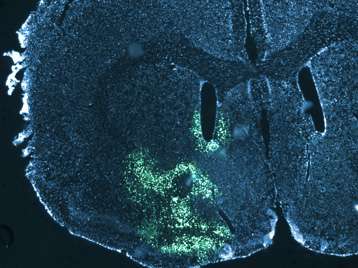Obesity: Are lipids hard drugs for the brain?

Why can we get up for a piece of chocolate, but never because we fancy a carrot? Serge Luquet's team at the "Biologie Fonctionnelle et Adaptative" laboratory (CNRS/Université Paris Diderot) has demonstrated part of the answer: triglycerides, fatty substances from food, may act in our brains directly on the reward circuit, the same circuit that is involved in drug addiction. These results, published on April 15, 2014 in Molecular Psychiatry, show a strong link in mice between fluctuations in triglyceride concentration and brain reward development. Identifying the action of nutritional lipids on motivation and the search for pleasure in dietary intake will help us better understand the causes of some compulsive behaviors and obesity.
Though the act of eating responds to a biological need, it is also an essential cultural and social function in our modern societies. Meals are generally associated with a strong notion of pleasure, a feeling that pushes us towards food. Sometimes this is dangerous: 2.8 million people worldwide die from the consequences of obesity each year. Fundamentally, obesity is caused by imbalance between calories consumed and expended. A sedentary life combined with an abundance of sugary, fatty foods provides fertile ground for this disease.
The body uses sugars and fats as energy sources. The brain only consumes glucose. So why do we find an enzyme that can decompose triglycerides, lipids that come in particular from food, at its core, at the heart of the reward mechanism? A team at the "Biologie Fonctionnelle et Adaptative" laboratory (CNRS/Université Paris Diderot) led by Serge Luquet, a CNRS researcher, has tackled this fundamental question.
If they have the choice, normal behavior in mice is to prefer a high-fat diet to simpler foods. To simulate the action of a good meal, researchers have developed an approach that allows small quantities of lipids to be injected directly into the brains of mice. They observed that an infusion of triglycerides in the brain reduces the animal's motivation to press a lever to obtain a food reward. It also reduces physical activity by half. What is more, an "infused" mouse balances its diet between the two food sources offered (high-fat foods and simpler foods).
To ensure that it is indeed the lipids injected that change the mice's behavior, these Parisian scientists made sure that the lipids could not be detected by the animal's brain any longer. They managed to remove the specific enzyme for triglycerides by silencing its coding gene, but only at the heart of the reward mechanism. The animal then shows increased motivation to obtain a reward, and if given the choice, consumes much richer food than average. This work echoes the previous work by their colleagues[1]: reducing this enzyme in the hippocampus causes obesity.
Paradoxically, with obesity, blood (and therefore brain) triglyceride levels are higher than average. So obesity is often associated with overconsumption of sugary, fatty foods. The researchers explain this: with long-lasting high exposure to triglycerides, mice always display lower locomotor activity. By contrast, food rewards are still attractive! The ideal conditions for weight gain are therefore in place. At high triglyceride contents, the brain adapts to obtain its reward, similar to the mechanisms observed when people consume drugs.
This work, financed in particular by CNRS and ANR, indicate for the first time that triglycerides from food may act as hard drugs in the brain, on the reward system, controlling the motivational and pleasure-seeking component of food intake.
More information: [1] "Hippocampal lipoprotein lipase regulates energy balance in rodents." Picard, A, Rouch, C., Kassis, N., Moullé, SM, Croizier, S., Denis, RG., Castel, J., Coant, N., Davis, K., Clegg, DJ., Benoit SC., Le Stunff, H, Luquet, S., Prévot, V., Bouret, S., Cruciani-Guglielmacci, C., Magnan, C. Molecular Metabolism (2013).
"Dietary triglycerides act on mesolimbic structures to regulate the rewarding and motivational aspects of feeding." Céline Cansell, Julien Castel, Raphaël G. P. Denis, Claude Rouch, Anne-Sophie Delbes, Sarah Martinez, Denis Mestivier, Brian Finan, Jaime G. Maldonado-Aviles, Merel Rijnsburger, Matthias H. Tschöp, Ralph J. DiLeone, Robert H. Eckel, Susanne E. la Fleur, Christophe Magnan, Thomas S. Hnasko, Serge Luquet. Molecular Psychiatry. April 15, 2014.


















